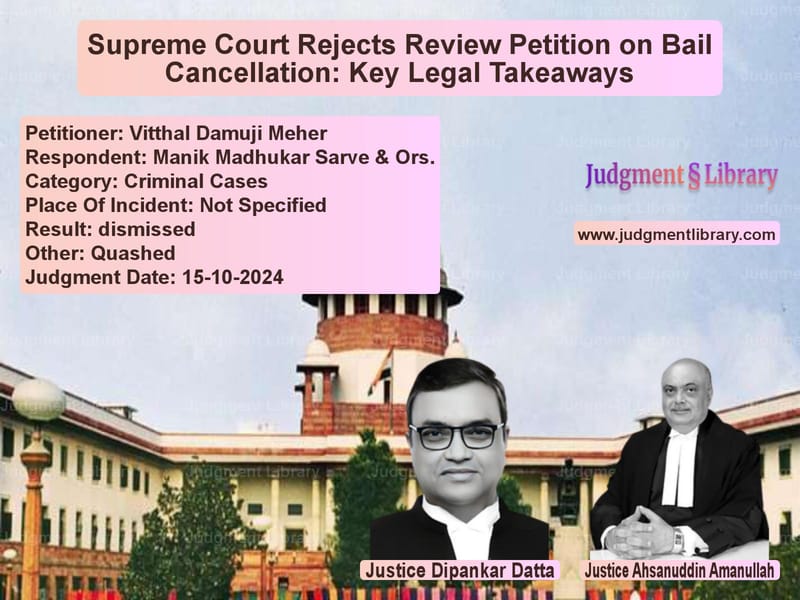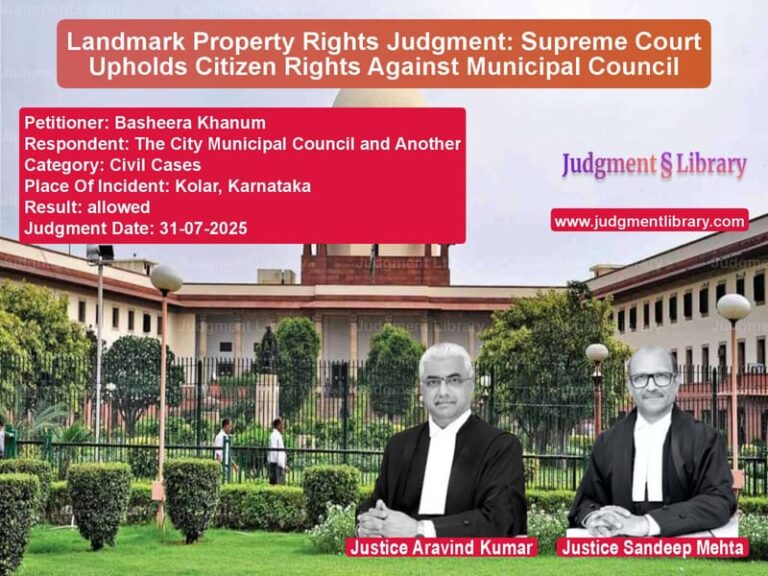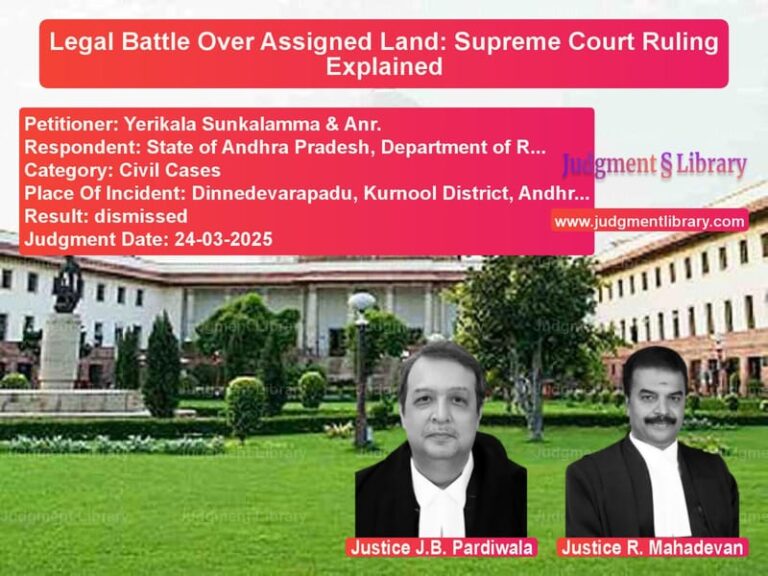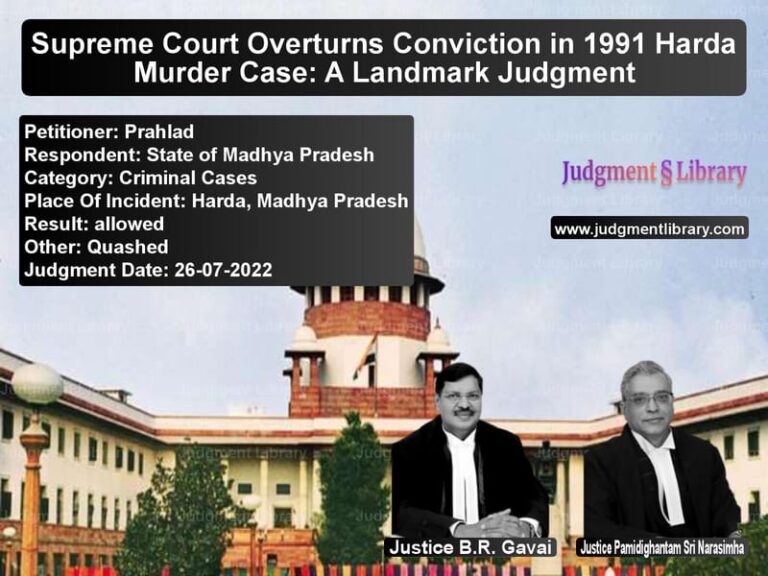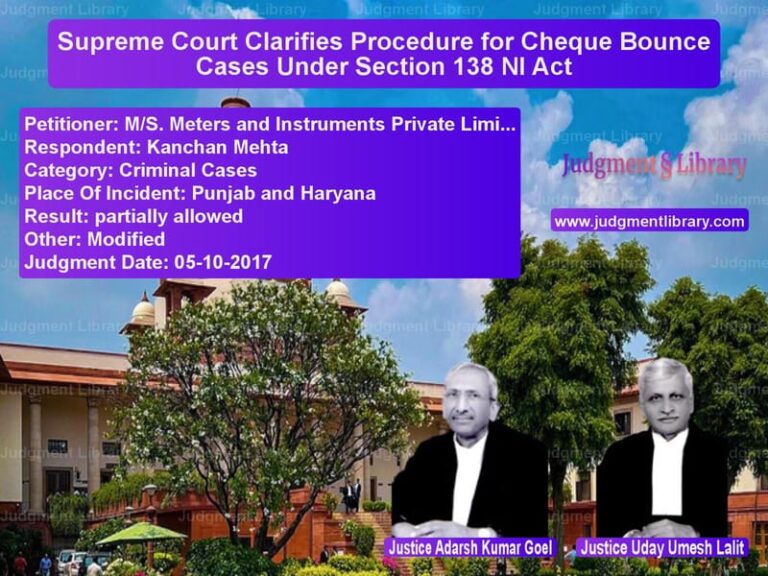Supreme Court Rejects Review Petition on Bail Cancellation: Key Legal Takeaways
The case of Vitthal Damuji Meher vs. Manik Madhukar Sarve & Ors. revolves around a review petition challenging the Supreme Court’s earlier decision to cancel bail granted to the petitioner. The judgment, delivered on October 15, 2024, dismisses the review petition, affirming that the petitioner failed to demonstrate any grounds warranting reconsideration of the previous ruling. This case highlights the legal principles governing bail cancellation, judicial discretion, and the limited scope of review petitions.
Background of the Case
The petitioner, Vitthal Damuji Meher, had been granted bail by the High Court on October 13, 2021, after being arrested on April 28, 2021. The bail order was subsequently challenged in the Supreme Court by the respondents, leading to the cancellation of bail on August 28, 2024. The Supreme Court directed the petitioner to surrender within three weeks.
Following this, the petitioner filed a review petition, arguing that the Supreme Court’s decision contained errors, including incorrect observations and an alleged failure to consider legal precedents supporting the principle that ‘bail is the rule, jail is the exception.’ The petitioner also contended that other co-accused in the case had been granted bail, and he was being singled out unfairly.
Petitioner’s Arguments
- The Supreme Court’s decision contained incorrect observations, particularly in Paragraph 26 of the judgment.
- The Court failed to specify the “change in circumstances” that justified bail cancellation.
- The principle that bail should be the norm, except in exceptional circumstances, was overlooked.
- The petitioner was unfairly treated as other co-accused had been granted bail.
- The period of incarceration before bail (approximately five and a half months) was significant and should have weighed in favor of the petitioner.
Respondents’ Arguments
- The review petition did not meet the legal threshold for reconsideration.
- The Supreme Court had already taken into account all relevant factors, including the petitioner’s role in the crime.
- The Court had explicitly allowed the petitioner to apply for bail again in the future if circumstances changed.
- Granting bail to other co-accused did not automatically entitle the petitioner to the same relief.
Supreme Court’s Observations
- The Court reaffirmed that review petitions must meet a strict legal standard and cannot be used as a means to reargue a case.
- It cited Sanjay Kumar Agarwal v. State Tax Officer and Sanjay Dubey v. State of Madhya Pradesh to reiterate that judgments should not be read as statutes and must be applied based on specific case facts.
- It held that merely because co-accused were granted bail, the petitioner was not automatically entitled to the same treatment.
- The Court rejected the claim that the petitioner had been incarcerated for a “significant” period, stating that five and a half months was not an unusually long duration.
- The judgment emphasized that the petitioner retained the right to file a fresh bail application before the Trial Court or the High Court if new circumstances arose.
Supreme Court’s Ruling
- The review petition was dismissed, as it did not meet the legal criteria for reconsideration.
- The Court reaffirmed its August 28, 2024, order directing the petitioner to surrender.
- It clarified that the petitioner’s bail application could still be considered by the lower courts if new facts or circumstances justified such a request.
- The petitioner’s request for an open court hearing of the review petition was also denied.
- Additional applications, including a plea to submit more documents and a request for exemption from surrendering, were dismissed.
Legal Implications of the Judgment
This ruling has several important legal consequences:
- Strict Standards for Review Petitions: The Court reaffirmed that review petitions cannot be used to reargue cases or express dissatisfaction with previous rulings.
- Bail Cancellation Precedents: The decision strengthens the precedent that bail can be revoked if circumstances change or if a higher court finds the earlier grant of bail unjustified.
- Judicial Discretion in Bail Matters: The ruling emphasizes that the mere fact that co-accused have been granted bail does not automatically entitle others to the same relief.
- Future Bail Applications Still Possible: The Court’s clarification that the petitioner can apply for bail again in the future ensures that the legal process remains open if new circumstances arise.
Conclusion
The Supreme Court’s dismissal of the review petition in this case reinforces the principle that judicial decisions on bail should not be reopened lightly. The judgment upholds the integrity of the legal process while allowing room for future bail applications based on changed circumstances. By setting a high bar for review petitions, the Court ensures that legal challenges remain focused on genuine errors rather than attempts to relitigate unfavorable outcomes.
Petitioner Name: Vitthal Damuji Meher.Respondent Name: Manik Madhukar Sarve & Ors..Judgment By: Justice Dipankar Datta, Justice Ahsanuddin Amanullah.Place Of Incident: Not Specified.Judgment Date: 15-10-2024.
Don’t miss out on the full details! Download the complete judgment in PDF format below and gain valuable insights instantly!
Download Judgment: vitthal-damuji-meher-vs-manik-madhukar-sarve-supreme-court-of-india-judgment-dated-15-10-2024.pdf
Directly Download Judgment: Directly download this Judgment
See all petitions in Bail and Anticipatory Bail
See all petitions in Judicial Review
See all petitions in Legal Malpractice
See all petitions in Fraud and Forgery
See all petitions in Judgment by Dipankar Datta
See all petitions in Judgment by Ahsanuddin Amanullah
See all petitions in dismissed
See all petitions in Quashed
See all petitions in supreme court of India judgments October 2024
See all petitions in 2024 judgments
See all posts in Criminal Cases Category
See all allowed petitions in Criminal Cases Category
See all Dismissed petitions in Criminal Cases Category
See all partially allowed petitions in Criminal Cases Category

